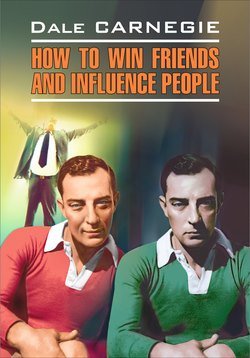Читать книгу How to win Friends and influence People / Как завоевывать друзей и оказывать влияние на людей. Книга для чтения на английском языке - Дейл Карнеги - Страница 9
Part two
Six ways to make people like you
ОглавлениеI
Do this and you’ll be welcome anywhere
Why read this book to find out how to win friends? Why not study the technique of the greatest winner of friends the world has ever known? Who is he? You may meet him tomorrow coming down the street. When you get within ten feet of him, he will begin to wag his tail. If you stop and pat him, he will almost jump out of his skin to show you how much he likes you. And you know that behind this show of affection on his part, there are no ulterior motives: he doesn’t want to sell you any real estate, and he doesn’t want to marry you.
Did you ever stop to think that a dog is the only animal that doesn’t have to work for a living? A hen has to lay eggs, a cow has to give milk, and a canary has to sing. But a dog makes his living by giving you nothing but love.
When I was five years old, my father bought a little yellow-haired pup for fifty cents. He was the light and joy of my childhood. Every afternoon about four-thirty, he would sit in the front yard with his beautiful eyes staring steadfastly at the path, and as soon as he heard my voice or saw me swinging my dinner pail through the buck brush, he was off like a shot, racing breathlessly up the hill to greet me with leaps of joy and barks of sheer ecstasy.
T ippy was my constant companion for five years. Then one tragic night – I shall never forget it – he was killed within ten feet of my head, killed by lightning. Tippy’s death was the tragedy of my boyhood.
You never read a book on psychology, Tippy. You didn’t need to. You knew by some divine instinct that you can make more friends in two months by becoming genuinely interested in other people than you can in two years by trying to get other people interested in you. Let me repeat that. You can make more friends in two months by becoming interested in other people than you can in two years by trying to get other people interested in you.
Yet I know and you know people who blunder through life trying to wigwag other people into becoming interested in them.
Of course, it doesn’t work. People are not interested in you. They are not interested in me. They are interested in themselves – morning, noon and after dinner.
The New York Telephone Company made a detailed study of telephone conversations to find out which word is the most frequently used. You have guessed it: it is the personal pronoun “I.” “I.” “I.” It was used 3,900 times in 500 telephone conversations. “I.” “I.” “I.” “I.”
When you see a group photograph that you are in, whose picture do you look for first?
If we merely try to impress people and get people interested in us, we will never have many true, sincere friends. Friends, real friends, are not made that way.
Napoleon tried it, and in his last meeting with Josephine he said: “Josephine, I have been as fortunate as any man ever was on this earth; and yet, at this hour, you are the only person in the world on whom I can rely.” And historians doubt whether he could rely even on her.
Alfred Adler, the famous Viennese psychologist, wrote a book entitled What Life Should Mean to You.
In that book he says: “It is the individual who is not interested in his fellow men who has the greatest difficulties in life and provides the greatest injury to others. It is from among such individuals that all human failures spring.”
You may read scores of erudite tomes on psychology without coming across a statement more significant for you and for me. Adler’s statement is so rich with meaning that I am going to repeat it in italics:
It is the individual who is not interested in his fellow men who has the greatest difficulties in life and provides the greatest injury to others. It is from among such individuals that all human failures spring.
I once took a course in short-story writing at New York University, and during that course the editor of a leading magazine talked to our class. He said he could pick up any one of the dozens of stories that drifted across his desk every day and after reading a few paragraphs he could feel whether or not the author liked people. “If the author doesn’t like people,” he said, “people won’t like his or her stories.”
